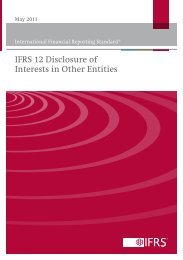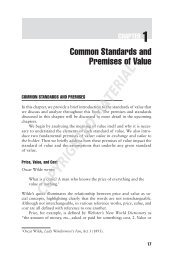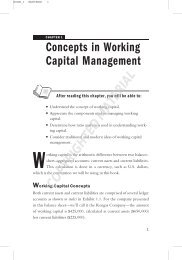ISSUE 5 2008 - Sweet & Maxwell
ISSUE 5 2008 - Sweet & Maxwell
ISSUE 5 2008 - Sweet & Maxwell
You also want an ePaper? Increase the reach of your titles
YUMPU automatically turns print PDFs into web optimized ePapers that Google loves.
Crim. L.R. Privilege 393<br />
he was not being placed under any compulsion to incriminate himself—he had<br />
done that already.<br />
Per curiam: It is dangerous to assess the strength of the claim to privilege on<br />
thebasisofthemotiveofthepersonseekingtoinvokeit.Therewillbemany<br />
cases where it will be ‘‘convenient’’ for a defendant to rely upon the privilege.<br />
Often his motives will be mixed. But even if the motives are mixed that is no basis<br />
for refusing the protection against self-incrimination. The court should not refuse<br />
protection merely because it suspects the good faith of the person seeking to deploy<br />
the privilege. After all, the principle applies to one who wishes to avoid conviction<br />
as much as to the innocent who wishes to avoid the inconvenience of a prosecution.<br />
Khan v Khan [1982] 1 W.L.R. 513; R. (on the application of the Crown Prosecution<br />
Service) v Bolton Magistrates’ Court [2003] EWHC 2697 (Admin); [2004] 1 W.L.R.<br />
835 applied. Den Norske Bank ASA v Antonatos [1999] Q.B. 271 distinguished.<br />
[Reported by Vanessa Higgins, Barrister]<br />
Lawrence McNulty for the defendant.<br />
Andrew Edis, Q.C. and Annabel Darlow for the Crown.<br />
Commentary. The court’s judgment, on a relatively straightforward matter, is<br />
surprisingly muddled. Although the concepts of legal professional privilege and<br />
privilege against self-incrimination are distinguishable (see Phipson on Evidence,<br />
16th edn (2005), para.23-15), they are used interchangeably throughout. What was, in<br />
fact, at issue was the appellant’s privilege against self-incrimination; the immunity that<br />
he was claiming did not relate to any communication with a legal adviser. The appellant<br />
had entered a guilty plea and the issue of his privilege against self-incrimination arose<br />
in the context of his evidence as a witness for his co-defendant. Although a witness<br />
may be compelled to answer questions put to him in cross-examination, this is subject<br />
to the privilege against self-incrimination. The classic statement on the extent of the<br />
privilege (to which the court made no reference) is provided in Boyes (1861) 1 B. & S.<br />
311. There it was said that the privilege exists where there is a ‘‘reasonable ground<br />
to apprehend danger to the witness from his being called to answer’’. In other words,<br />
the appellant could only claim privilege in relation to any risk that answering questions<br />
might reasonably have left him open to further charges or punishment.<br />
The judgment contains little by way of illustration of the matters on which the<br />
appellant was cross-examined. However, the law is clear and if the trial judge properly<br />
concluded that the matters on which he was questioned fell within the scope of his<br />
position statement, the appellant could not claim the privilege. However, against the<br />
backdrop of a relatively brief position statement relating to a guilty plea, whether<br />
or not the matters on which the appellant is questioned go beyond the confines of<br />
that statement may generally involve fine judgments. In circumstances such as those<br />
found in the present case, it may, as a matter of good practice, be preferable to deal<br />
with sentencing before a defendant is permitted to proffer testimony for or against<br />
a co-accused. Where a defendant gives evidence against a co-accused the fact that<br />
there is no possibility of a reduced sentence may help to ensure that the evidence he<br />
gives is reliable. On the other hand, where he gives evidence for a co-accused, until<br />
sentence is determined, the defendant might have a legitimate claim to privilege on<br />
the basis that information that he provides under cross-examination might adversely<br />
affect the sentence that is handed down. To this extent, requiring him to answer<br />
questions put to him in cross-examination might expose him to the risk of a degree of<br />
© SWEET &MAXWELL






